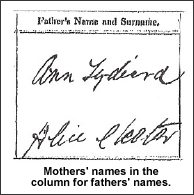One set of my mum’s great grandparents, William Liddiard and Ellen Cleeter, were both born illegitimate and have the unique distinction, in my experience, of each having their mother’s names listed in the father’s column on their marriage certificate.

They were married in Kintbury, Berkshire on 31 May 1852. I have managed to trace their families back through the censuses: William was living in Kintbury with his grandparents George, a blacksmith, and Maria at the time of the 1841 census. George and Maria were my 4x great Grandparents.
Whilst trying to discover some information about the fathers of this set of great great grandparents, I was idly googling one day when I came across a website based in New Zealand and dedicated to Liddiards of Aldbourne in Wiltshire, LIDDIARD of Aldbourne, Wiltshire (1620-present).
Aldbourne being relatively near to Kintbury, despite being in a different county, made me think that I may discover something about my ancestors on this website, which is based around a huge ahnentafel tree and, sure enough, I found my Liddiards.
George and Maria, my 4x great grandparents were as far back as I had confirmed for myself and there they were, with George being accused of having a criminal record!
There in black and white was quoted an extract from The Times of 31st December 1830 –
LIDDIARD George, age 41, blacksmith, not transported; place and date of trial – Reading special assizes, 27th December 1830; Offence – charged with having on the 23rd November destroyed a threshing-machine, the property of William Widmore Webb, at Kintbury – guilty; Sentence – 18 calendar months of hard labour.
I then found a report of the trial in The Times Digital Archive for 5th January 1831.
George was sentenced on Tuesday 4 January 1831 and the men were brought in groups before Judge Mr Justice Parks. It appears that the harshness of the sentence was partly dependent on how menacing the riots/attacks had been and also whether they had taken place during the day or at night. Night time offences tended to be sentenced to deportation of 7 years per offence, to run consecutively. So any man being convicted of two counts of rioting would serve 14 years transportation.
George Liddiard was amongst a group of eight offenders; three of the group were sentenced to 7 years deportation for the abusive nature of their offence and the fact that they took place at night. The other five were sentenced to imprisonment, all serving 12 months apart from George, who got 18 months hard labour. It was perhaps considered that, being a blacksmith, he should have known better than the labourers and not got involved.
George got off relatively lightly; at least three men were sentenced to death, two of whom were commuted to life deportation.
TAKE HIM DOWN!
As sentence was passed in January 1831, I gauge that George would have been released early July 1832, by which time my great great grandmother Ann Liddiard had given birth (illegitimately) to my great grandfather William. Although Ann was a grown woman of around 19 when George began his prison sentence, she was not too old to have ‘gone off the rails’ in the absence of her father. One more of the mysteries of genealogy unlikely ever to be revealed.
Rosie Knees
© Rosie Knees 2008
Machine breakers
We all know that our agricultural labourer ancestors had a hard life, but times were particularly bad during 1830 in the south of England.
There had been poor harvests during 1829 and 1830, which had caused the price of bread to be increased and unemployment to rise as farmers facing their own hardships were unable to pay the labourers. Some authorities even reduced the level of poor relief at the same time. The last straw was the increase in the amount of threshing machines which reduced the need for labourers still further.
In the autumn of 1830 the ‘swing riots’ broke out. The term was coined from the mythical leader of the rioters, one Captain Swing. In reality the riots were organised and led by a few of the more determined labourers. The main objective of the riots was to destroy the threshing machines which were perceived to be the cause of the labourers’ hardship, hence the term ‘machine breakers’.
Rosie Knees
